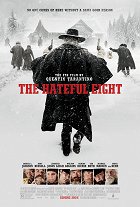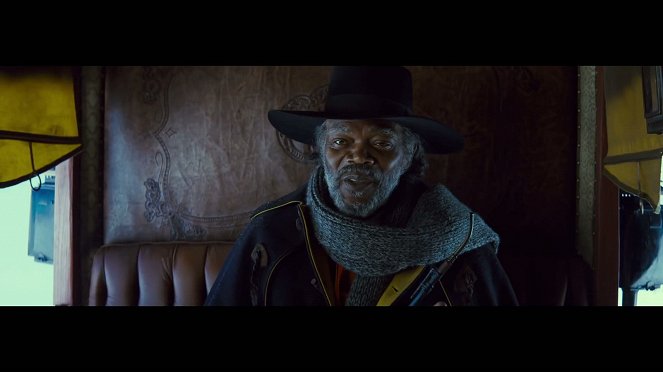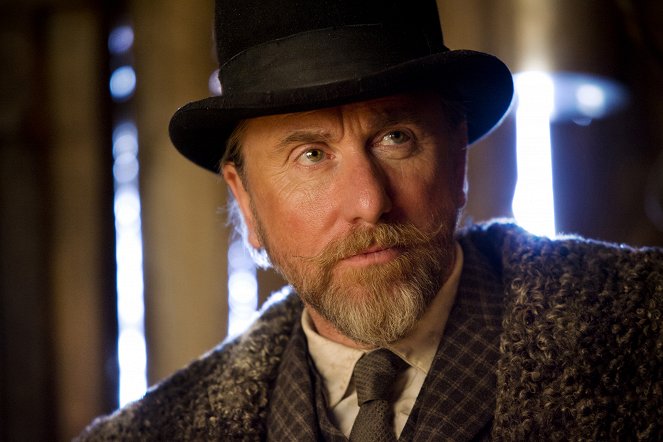Directed by:
Quentin TarantinoScreenplay:
Quentin TarantinoCinematography:
Robert RichardsonComposer:
Ennio MorriconeCast:
Samuel L. Jackson, Kurt Russell, Jennifer Jason Leigh, Walton Goggins, Demián Bichir, Tim Roth, Michael Madsen, Bruce Dern, James Parks, Dana Gourrier (more)VOD (3)
Plots(1)
Six or eight or twelve years after the Civil War, a stagecoach hurtles through the wintry Wyoming landscape. The passengers, bounty hunter John Ruth (Kurt Russell) and his fugitive Daisy Domergue (Jennifer Jason Leigh), race towards the town of Red Rock where Ruth, known in these parts as "The Hangman," will bring Domergue to justice. Along the road, they encounter two strangers: Major Marquis Warren (Samuel L. Jackson), a black former union soldier turned infamous bounty hunter, and Chris Mannix (Walton Goggins), a southern renegade who claims to be the town's new Sheriff. Losing their lead on the blizzard, Ruth, Domergue, Warren and Mannix seek refuge at Minnie's Haberdashery, a stagecoach stopover on a mountain pass. When they arrive at Minnie's, they are greeted not by the proprietor but by four unfamiliar faces. Bob (Demian Bichir), who's taking care of Minnie's while she's visiting her mother, is holed up with Oswaldo Mobray (Tim Roth), the hangman of Red Rock, cow-puncher Joe Gage (Michael Madsen), and Confederate General Sanford Smithers (Bruce Dern). As the storm overtakes the mountainside stopover, our eight travelers come to learn they may not make it to Red Rock after all... (The Weinstein Company)
(more)Videos (28)
Reviews (16)
I'm sick and tired of the over-the-top violence in Tarantino's films, and I write this as someone who enjoys Fulci and similar masters of horror gore. Unlike most, I enjoyed the first hour more, with the witty dialogues that, if fleshed out to a greater scope, would have made a fine play. But then Quentin breaks free with his explicit bloody charge and it all goes to hell. This is a symptom in all his recent films, you know exactly what is coming in the next few minutes. Moreover, as the story unfolds, it makes less and less sense, with a verbal diarrhea that feels unnatural thrown at the viewer. Would real characters talk this mechanically? I still can't get enough of Pulp Fiction to this day, it's a masterpiece where everything clicks, but ever since Kill Bill, which was Tarantino's last great film in my eyes, his work has become more and more distant. There's no longer any excitement on my part, just cautious curiosity, and that's a shame.
()
Even though Quentin Tarantino is not my cup of tea, I am always curious about his next movie. However, after the years I already know that he will surprise me with nothing else than the fact that he keeps roping one acting ace after another into his movies. That may be the reason why I still cannot miss single one of his movies. And The Hateful Eight again did not disappoint. If I wouldn’t blame the actors, whom I hold in high respects, I would blame the film itself, which incredibly overacts. The 182 minutes of footage really show Quentin’s big confidence as he thinks that I will fall for a film this long. The problem is that he stretched a good premise twice as long than this kind of film would deserve. For example, the first scene in the post chaise is incredibly deadening and boring, and nothing fundamental happens there. The film gets a really interesting touch only towards the ending, when something finally starts to happen. At the time you can expect basically anything because everybody playing in this movie has a character so absurd that the audience knows that anything can happen. Actors with their polished English from the American countryside create the impression that almost every line uttered in the movie is a catchphrase. And there is quite a lot of them. Tarantino again did not disappoint. However, it never ceases to fascinate me that his fans still buy everything he makes. Just switch the locations for the Second World War and you get Inglorious Basterds. Switch it for the America filled with gangsters and you get Pulp Fiction. Is this movie really that original as it pretends to be?
()
The Hateful Eight is a great Tarantino revival and, after a long time, a film for which I would not regret paying a higher ticket price (though I’d still rather pay more for a screening from a 70 mm print). Faces familiar from Tarantino’s previous films, a return to the intimate “whodunit” concept of Reservoir Dogs (despite the epic establishing shots and imaginative use of spatial partitioning, which best stand out on the big screen), references to its own universe (Red Apple tobacco), division into chapters (which, in addition to rhythmising the narrative, serve to reveal new information and redirect the viewer’s expectations), the non-chronological organisation of the narrative (which doesn’t break up the film, but contributes to its overall integrity), visual and motif references to spaghetti westerns (Jackson stylised as Lee Van Cleef) and John Ford’s westerns, as well as to (slapstick) splatter flicks and Carpenter’s The Thing, variations on narrative formulas from blaxpoitation and samurai films, not individual scenes but almost the whole film based on waiting (ours and the characters’) for something to happen (and when something finally does happen, there is – in the roadshow version – an intermission followed by a flashback with Godard-esque commentary) and whether it turns out at the end that some of the characters were connected to each other by something other than a chain. The constant delaying of action and the use of dialogue to draw out scenes of simple actions, which the aforementioned Godard enjoyed using to test the patience of his viewers (see the magnificently retarded scene from Breathless with Belmondo and Seberg blabbering in a hotel room) make The Hateful Eight a unique film not only in the context of contemporary Hollywood production, which offers viewer satisfaction much more quickly, but also in Tarantino’s filmography. The first half of the film is not just a sadistically long prelude. The director uses various delaying tactics from beginning to end and even lets the characters provocatively point that out (“Let’s slow it down”). Regardless of the large number of identified (self-)references, this is a masterfully written and acted film in which everything elegantly clicks into place in the end; it just intentionally takes longer than would have been necessary, which would seemingly work as well only as a stage play (the film is aware of its theatrical structure and thematises it with gusto). Most of the characters play a certain role and the film derives much of its tension from the characters/viewers not knowing who is pulling which end of the rope. Though basically everyone is a lying bastard (those who aren’t won’t survive long), your sympathies will constantly shift from one character to the next depending on what Tarantino reveals about them. As much as to the detailed distribution of power (consisting not only in who has a loaded gun in their hand, but also in who knows what – see all of Chapter Four), the film owes its dynamism to the fast-paced dialogue, the energetic acting and camera movements (drawing our attention to important motifs), the lighting, the refocusing, the work with the depth (height and width) of the space and the editing (taking into account who is looking at whom and how). Even more than Django Unchained, The Hateful Eight would like to be a political allegory in the style of the subversive counterculture westerns of the 1970s, using not very sensitive means to draw attention to the parallels between racism and capitalism. The literalness of the film’s ideological level (lines like “When niggers are scared, that’s when white folks are safe”, the division of the bar into individual American states) contrasts with the much more subtle means by which Tarantino builds tension, creates an oppressive atmosphere of distrust and communicates essential information about who is an ally or an enemy. Even so, this is a brilliant allegory that offers very disturbing and not entirely unambiguous commentary on a different interpretation of law and justice. Tarantino has made an extremely nihilistic western that successfully creates the atmosphere of an era in which people are united mainly by their hatred of a common enemy. Primarily, however, it abounds with the narrative skill of the best Agatha Christie novels. I believe that, like Christie’s books, The Hateful Eight will only get better over time. 90%
()
(less)
(more)
An almost detective-like Tarantino, with amazing casting at its back moves the genre into entirely uncharted waters (well, snowy hills) while still remaining himself. A well balanced team of actors, headed by Samuel L. Jackson, gives masterful performances, supported by amazing dialogues and catchphrases. The stunning camerawork offers breathtaking sceneries - at times like from another world - and Morricone’s music is gloomy and cold in a way we haven’t heard for a long time. A quality piece. So you’re just starting to imagine it all, right?
()
With such perfect cinematography and the wonderful old-fashioned Ennio Morricone soundtrack, this simply can't go completely wrong; but I was still expecting something more. Quentin Tarantino's repeated love for the Wild West promised to rid itself of all the small flaws that afflicted the otherwise wonderful Django Unchained, but this is a step backwards. The never-ending dialogues about nothing surprisingly often remain never-ending dialogues about nothing, and it is only when the reveals start coming in the second half that the film finally succeeds. The pace never drops, every shot has fatal consequences, and the resolution of the last plot twists even manages to nail you to your seat despite its bloody black humor, proving that this ride was worth it. Still, I would be happy if Quentin moved on from Western-themed stories (or, in this case, half-bred cowgirls) and went somewhere else. Because in the stagecoach chapters, his previously commonplace sins against the audience have started to creep back in, and instead of a symbiosis of the creator and the viewer, his fetish for reference and drawing things out are appearing again after all these years.
()



Ads